- Home
- Alan Scholefield
Never Die in January Page 8
Never Die in January Read online
Page 8
“You can open it.”
She made no move.
Irene opened it. “Peppermint creams. You like those.”
Mrs Isard pinched the end of her cigarette and put it carefully in a flat tobacco tin. Then she spoke. It sounded watery, like Portuguese.
“Put your teeth in, Mother.”
Teeth, covered in blood and tissue, on the kitchen lino. Her father, fist balled, standing over them.
Don’t challenge him, her mother had always said. Never challenge him.
He waited. But neither challenged. Her mother couldn’t, her jaw was broken. Irene didn’t; she was learning fast.
That’s where the teeth had gone. Her mother had been in her forties then. It wasn’t nice to lose your teeth in your forties. Irene had only been a little girl.
Mrs Isard put her hand quickly to her mouth, made a small movement, and when she removed it her face had filled out substantially.
“You didn’t come last week.”
The teeth clicked but at least Irene could make out the words.
“I told you, Mother, I was moving into a flat.”
“And that’s more important!”
“I didn’t say that. Of course you’re important.”
“I’m used to it. You didn’t visit me for years…and years…!”
Mrs Isard’s fingers were working at the lid of the tobacco tin.
“Let me open it for you.”
“I can manage. I managed all those years without you.”
“I know that.” She didn’t want to discuss this.
At last she got the lid off, selected a longish butt, and lit it.
“Please do not drop your butts in the urinal,” Mrs Isard said. “It makes them soggy and difficult to light.”
Irene waited, she had heard it all before.
“Vic told me that. Told me he’d seen it written on the wall in a gents’ lav.”
For a long time after his death Mrs Isard had not mentioned her late husband’s name. It was as though she feared he might come up out of his grave and smash her face. But she had gradually become less afraid of him and because of that, Irene thought, he was being rehabilitated in her mind. One day she would no longer remember the broken bones, the missing teeth, and Vic would return to what he had originally been: the young man who had first made love to her, who had made her laugh with his jokes of soggy butts in the urinal.
“What are these?” Mrs Isard said.
“I told you. Peppermint creams.”
“I don’t want the bloody things. You know what I want.”
“No, Mother, I do not know what you want.”
“Stuff. That’s what I want.”
She knew but played it out. “What sort of stuff?”
“Don’t be stupid.”
“You said you’d been off it for years…! The last time — ”
“Never mind the last time. If you were a proper daughter you’d think of me.”
“That’s why I won’t bring you drugs. That’s exactly why. Because I do think of you.”
Over her mother’s shoulder the silent set was showing a Tom and Jerry cartoon. The grey winter’s day was closing down, the room was growing dark.
“How’s your new room?” Irene asked. “I’d like to see it sometime.”
“Why? Because you’re paying for it? To see if you’re getting your money’s worth?”
“Not at all. Just seeing you safe and secure and comfortable is payment enough. Seeing you looked after like you should be.”
“It’s a bloody institution! Don’t you understand what that is!”
“I know it’s a caring place.”
“Caring! It’s a madhouse.”
“No it isn’t. It’s not that, Mother. It’s a private nursing home.”
“It isn’t, it’s a loony bin.”
“Don’t be so silly. It’s what’s called a half-way house.”
“Half-way to what? To Bedlam?”
“Where would you rather be? Here or that place where they found you the last time? Meths, for God’s sake! And drugs and I don’t know what. You were never like that.”
“How do you know what I was like? You weren’t here! Anyway a daughter should look after her mother.”
“You know I couldn’t.”
There was a pause.
Mrs Isard said, “They say it would be better for me to live in the community. Who with, I asked, my daughter lives in Spain? They said Spain would be wonderful. Sun and oranges. And my own daughter. They wanted me to be with my family.”
“Stop it, Mother. There was no way. Carl was — ”
“But I used to say she loves me very much. She writes to me all the time. But they knew I was lying. They do the post, you see.”
“Mother — ”
“And every day I would say: Anything for me? And they would say: “No, Mrs Isard.” But I wouldn’t tell that to the others. I didn’t want to be the only one without a letter.”
“All right! Get it all out! This is a kind of poison. You knew why we went to Spain. You knew Carl was ill. You knew I had to care for him.”
“He was a nancy boy!”
“He was kind and gentle!”
They stopped. In the sudden silence they realized they had been shouting at each other.
Slowly Mrs Isard put out her hand and Irene held it. “Don’t mind me. It’s just — ”
“I know.”
“I’m really very pleased to see you. You do know that, don’t you?”
“Of course.”
She touched Irene’s face. “My daughter. My only daughter. Are you really here?”
“Yes, Mother, I’m really here.”
“Sometimes I can’t quite believe it. Sorry…not about you being here. But about Grade. I say to myself that it didn’t…couldn’t…happen. But it did, didn’t it? It’s not a dream, is it? Not part of all…all this…?”
“No, Mother, it happened. Grace killed herself and it’s not part of a dream or your illness.”
“Last time you said murder.”
“That’s my word for it. They called it suicide.”
“I should have done that,” Mrs Isard said. “Then I wouldn’t be in this place.”
“Please don’t say that, Mother. I’m so glad you didn’t. I have no one now. Carl’s gone. Grace has gone — ”
“There’s only the two of us left.”
“Just the two of us.”
“Do you think, I mean…could we live together?”
“I’ve been thinking about it. Yes, we could. And I’ll make it up to you, you’ll see. I’ll make it up for father and for Carl. We’ll go away. Somewhere no one knows us.”
“That’ll be lovely. Completely unknown.”
“That’s right, by the sea perhaps.”
“I love the sea.”
“East Anglia.”
“Orford. Where I took you when you were little.”
“Somewhere like that. And we’ll have a wooden house that looks out on the water and…Don’t cry, Mother. Please don’t cry.”
“But when!” Mrs Isard’s voice was filled with pain. “When?”
“Soon. I promise you it’ll be soon. Just as soon as I find out about Grace.”
No man’s land.
That’s what Eddie always called it.
Gladys Twyford was standing at her sitting-room windows looking out at the exhausted grass and trees, the cracked concrete paths, the detritus, of the Green Leas Estate.
She could hear him now: “Bloody no man’s land out there. We’re in a trench here and they’re in a trench there, and that’s no man’s land. But they don’t stay in their trenches. Bloody yobs.” Not that Eddie had been in the war. Not the proper war. He’d been in Cyprus in the Emergency when he was doing his national service — but as a driver. Never with a gun, Eddie had always driven things.
That’s what he had done in the police. It wasn’t what he wanted to do. He’d wanted to be a detective but instead he’d got as
far as a detective “aide”. Not quite a detective but better than a copper on the beat. And then he’d been Mr Macrae’s driver and that’s what he’d liked best.
Gladys fetched her coat from the wardrobe. “No good just standing here,” she said to bulldog. As she passed she touched his head for good luck. “I’ll go now it’s quiet. Speak to Mr Geach. I’ll tell him about the noise. The music. The bangings. He’ll listen. It isn’t as though I’ve got Eddie to protect me anymore.”
Bulldog smiled at her. His pink tongue was hanging out and his head was on one side. He looked very like pictures she had seen of Sir Winston Churchill.
She began to plan her route. Mr Geach’s office was in Jasmine House. That was two huge blocks away from her, beyond Primula and Marigold. A few years after they came to the estate Jasmine had been changed to Mandela House but was now Jasmine again. She didn’t know why. She didn’t know why it had been changed in the first place. Eddie had told her once but she had forgotten.
She had to walk about four hundred yards. It didn’t sound much but it was through no man’s land. She’d seen movies about the first war. Mines and snipers; bombs and guns; bayonets. It wasn’t the Hun any longer but the young. Different enemy, but the same result.
“Just a coat,” she said to bulldog. “No hat. I told you what happened last time when that kid knocked it off. Then he kicked it. God knows where it is now. And it was a good hat.”
But she needed something on her head because it was so cold. Yet a scarf…what if someone came up behind her, grabbed the scarf and twisted it round her neck…? No…not a scarf.
Rape.
That was what she feared most.
There had been cases of elderly women raped in dim forgotten hallways.
It had bewildered her. “Why women of my age?” she had said to Eddie. “Why?”
“Perverts,” he had replied.
“I’ll keep to the paths,” she said to bulldog. “Stay away from the blocks.”
She took one last careful look out of the window. In the cold grey noon the estate was deserted.
“Right. I’m off.”
She locked and double-locked and triple-locked the doors. The wind was cold and she bent her body against it. She looked down at her feet as she walked.
“Don’t have eye contact with anyone,” Eddie used to say.
That was the first time she heard the phrase. Now she knew she shouldn’t have eye contact with people in pubs or shops or on buses or trains or on the streets. Only the other day she had looked up and seen a young man coming towards her in Battersea High Street.
“Get out of my way,” he said, and she’d had to step into the gutter.
When she’d been young she’d never walked with her head down. Then people looked at people. Nowadays if you looked someone in the eye you could be assaulted.
She passed Primula. A young person — she couldn’t differentiate these days between male and female — was standing near the entrance. Gladys dropped her head and walked quickly past. At any moment she expected to hear a step, a voice, feel a push. She didn’t have her bag. She had nothing of value. Her keys, on a piece of string round her neck, nestled between her breasts.
She felt her heart beat faster. Then she was clear of Primula and batting along towards Jasmine.
The notice on Mr Geach’s door said Housing Manager. A few years back a secretary had sat just outside it, but she’d gone in one of the many cost-saving schemes. She knocked on the door.
“Yes?” The voice was displeased.
Timidly she opened the door. Mr Geach was seated behind his desk on which rested a mound of paper: letters, bills, estate notices, estate regulations. He was a plump man in his thirties, prematurely bald, with tufts of implanted hair growing out of small red scabs.
“Yes?”
“It’s Mrs Twyford. Number Four, Rosemary.”
“Yes?”
He was holding one hand over the mouthpiece of his phone.
“If you’re talking, I’ll wait,” she said.
He looked at her angrily. “What d’you want?”
“I come about the transfer.”
He opened his mouth as though to shout at her, then his expression changed.
He said into the mouthpiece, “I’ve got to go now, Yvonne. No…No…Don’t be like that. I’ll talk to you later.”
Gladys heard a quacking noise come down the line then he replaced the receiver.
“Transfer? What transfer?”
“My husband, Mr Twyford, came to see you.”
“Twyford?”
“Mr Eddie Twyford.”
Geach shook his head. “Don’t remember him. I get a lot of people in here. Just because there’s no one in now doesn’t mean to say I don’t get crowds.”
He got up from his desk and walked about the room. In one comer was a new set of golf clubs — the plastic wrappings still on the heads of the woods and irons. He took out a five-iron and waggled it in his hands.
“What d’you want a transfer for, Rosemary’s all right isn’t it?”
“It’s terrible! I mean it’s all young people. Not that I got anything against young people. We was all young once. But I’m not young, see. They have their ways and I have mine.”
“So you don’t like youth?”
“No, sir, I never said that. I said — ”
“What if everyone was your age? What would the world be like then?”
The phone rang. “Yes? Oh, yeah. Tomorrow’s OK. No…no…I can get away. First tee ten-thirty…Yeah. I got them…complete set…Mizuno.” He laughed. “It’s only money. Which reminds me…bring some.”
He put down the phone. Gladys said, “It’s the music. Thump…thump…thump…All night. I can’t sleep. And they say they’re selling drugs there. Banging on the doors all night.”
“Who says so?”
“Well
“That’s a serious allegation, that is. It’s a matter for the police. You should report it if you saw it.”
“I haven’t seen anything. Nothing. No, no. But people talk…” Geach looked at her severely, put the new five-iron back in the bag, pulled out a putter, and stroked a few imaginary balls.
“So where do you want to go if you got a transfer?”
“Somewhere it’s quiet. Somewhere I’m not frightened all the time.”
He went to a big wall chart of the Green Leas Estate. Each block was broken up into squares with its number and the name of its occupants.
“Let’s see…”
She waited. Hope soared.
He tapped the handle of the putter against the chart. “Briar. You know Briar House?”
“It’s the end one, isn’t it?”
“That’s it. Last block. Far away from Rosemary.”
“It’s nearer the shops.”
“And the bus.”
“And the tube.”
“And it’s mainly elderly people.”
It sounded like the Promised Land.
“Have you got a vacancy there?”
“No.”
“Oh.”
She felt dashed, as though he was playing a game with her. “Not yet.”
Hope rose again. “I could wait,” she said. “If it wasn’t long.”
“But…” He tapped the chart again. “Maybe She felt she was being dangled over a cliff.
“There is one…no…”
“What?”
“I promised it to a lady in Marigold. But she’s in hospital. They’re not too hopeful about her coming out.”
“Mr Geach, I — ”
“They’re not sure.”
“But couldn’t you — ?”
“Wouldn’t be fair, would it? She comes out and there’s no flat. That’s not right.”
No, she thought, it wasn’t right. What if it was her coming out of hospital and the flat was gone, the flat she was looking forward to? She remained silent.
He hit the chart a good whack with the putter. “But time and tide, Mrs…”
“Twyford.”
“Time and tide wait for no man, Mrs Twyford. Anyway she hasn’t paid the admin costs.”
“What’s that?”
“Administration costs.”
“Costs?”
He smiled at her. “All this costs money, you know.”
“But I thought the council — ”
“They used to pay the admin costs. But now we’ve got to find the money ourselves. It’s what Mrs Thatcher wanted us to do. Be self-sufficient. Stand on our own feet.”
“How much are the administration costs?”
“Five hundred pounds.”
“Five hundred!” She was shaken.
“And in cash. The authorities like it in cash. Safer than cheques.”
“But I’ve only got Mr Twyford’s pension.”
“Depends how much you want to move, doesn’t it?”
The phone rang. “Yvonne? Yeah. Right. Hang on a sec.” He covered the mouthpiece of the receiver with his hand. “Think about it, Mrs Twyford.”
Still bewildered, Gladys went out into no man’s land. At first she thought all was quiet. Then, out of the mist, came a line of youths. Six or eight of them, dark shapes in the swirling fog. Afraid, she backed into the doorway.
But they did not see her. They went on in silence, a group yet not a group, marching…marching…
CHAPTER XI
“It was my mother’s business,” Gerald said. “I joined her after I left school.”
“Let me get you another drink,” Irene said.
As she moved to take the glass from him there was a low rumble in the dog’s throat.
“It’s all right, old chap,” Gerald said, patting him.
He had come half an hour earlier — at Irene’s request — to make an inventory of dilapidations to accompany the lease of the flat. She had seen him arrive in a black Porsche Carrera. At first she thought it was being driven by an animal. A huge tan-coloured dog was sitting in the passenger’s seat in its own safety harness. The dog’s name was Simba and Gerald had brought him in on a stainless-steel choke-collar. The leash was plaited leather and looked expensive. Simba was now lying alert on the floor at Gerald’s feet. His size made the room look small.
“I’ve never seen a dog like that,” Irene had said as they entered the flat.
Simba was obviously a talking point and Gerald spoke about him over the first drink.

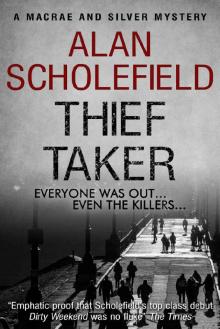 Thief Taker (A Macrae and Silver Mystery Book 3)
Thief Taker (A Macrae and Silver Mystery Book 3)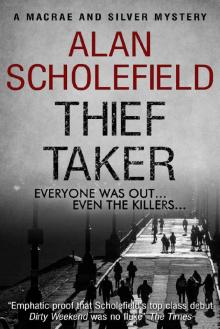 Thief Taker
Thief Taker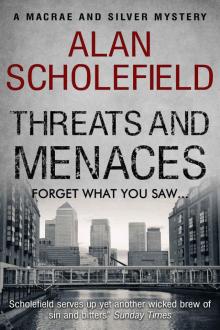 Threats and Menaces
Threats and Menaces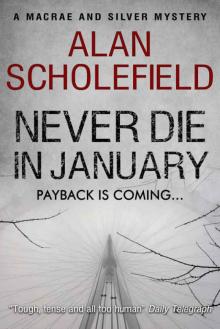 Never Die in January
Never Die in January Venom
Venom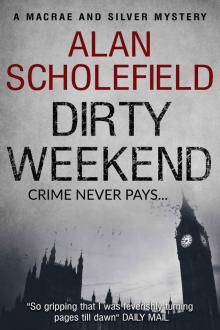 Dirty Weekend (Macrae and Silver Book 1)
Dirty Weekend (Macrae and Silver Book 1)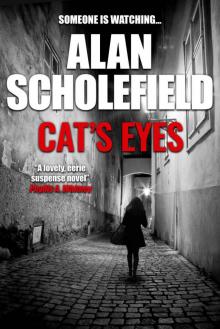 Cat's Eyes
Cat's Eyes Berlin Blind
Berlin Blind The Sea Cave
The Sea Cave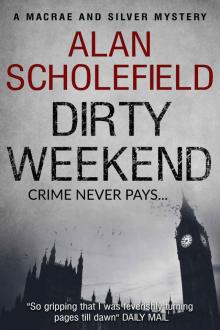 Dirty Weekend
Dirty Weekend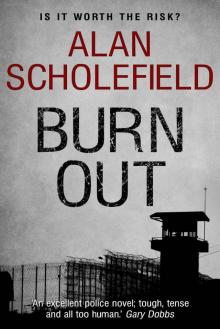 Burn Out (Dr. Anne Vernon Book 1)
Burn Out (Dr. Anne Vernon Book 1)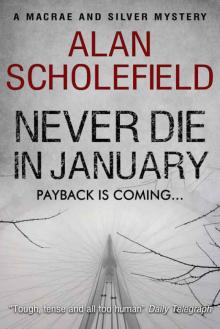 Never Die in January (A Macrae and Silver Mystery Book 2)
Never Die in January (A Macrae and Silver Mystery Book 2)